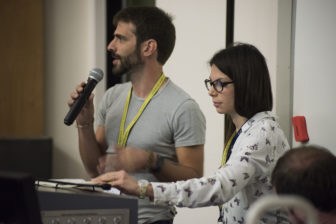At the 2017 Global Investigative Journalism Conference, Stevan Dojcinovic of the Crime and Corruption Reporting Network (KRIK) in Serbia, investigative reporters Cecilia Anesi and Giulio Rubino of Investigative Reporting Project Italy (IRPI), Solomon Serwanjja of NBS television in Uganda and KTN (Kenya), and Joe Davidson of the U.S. Department of Justice International Criminal Training Assistance Program shared their experiences of what it takes to investigate and report on mafias, mobs and cartels.

Giulio Rubino and Cecilia Anesi of the Investigative Reporting Project Italy (IRPI) discuss the complexities of reporting on the Costa Nostra in Italy. Picture: Madelene Cronjé
Standing outside a prison trying to speak to a gangster they were in the middle of writing stories about, Stevan Dojcinovic and his partner Pavla Holcova from the Czech Center of Investigative Journalism (CCIZ), were faced with two obstacles.
“This gangster didn’t talk to journalists,” he said. “He had a reputation for refusing reporters.”
Not only that, but they also had the problem of getting into the prison complex where their subject was serving time, because they couldn’t get permission to enter, despite trying all the conventional methods.
So they sought out an unconventional method.
Dojcinovic and Holcova watched the prison for a while and discovered that it had a day reserved for “conjugal” visits of wives, girlfriends and, well, prostitutes.
“Sex Day” the prison guards called it crudely. To the reporters, it sounded like a golden opportunity. They decided to try going in that day—with Holcova posing as a prostitute..
“They rejected her at first because she wasn’t dressed ‘appropriately’ for a prostitute,” Dojcinovic recounted. “Eventually, some of the women came to help us and pointed out a shop where clothing was rented to them. She went and changed.”
Miniskirt and crystal studded sandals on, Holcova got in line.
This time she made it through the door.
Upon meeting the subject of their investigation in his prison cell she revealed herself to him as a journalist. The gangster was impressed by the audacious move. He respected her fearlessness.
“He spent two hours chatting with her,” Dojcinovic said with a wry smile. “He saw that we were willing to use tactics the criminals themselves might pull and he respected that.”
After the interview, however, the gangster warned her, “If you write something that will hurt me, I will find you.”
The danger of reporting on organized crime is clear: get it wrong and it could kill you.
Respect Your Sources and Subjects
Reporting on organized crime figures can be a high-risk venture if reporters don’t know what they’re doing. A failure to respect the sources and the subjects of your stories could, at best result in the loss of sources and, at worse, in death threats or murder.
“Sources are essential,” said Serwanjja as he spoke about his reporting on the documentary investigation on Kampala’s thief gangs. “You need to earn their trust. Above all, never condemn them. Listen to their story.”
His peers in Italy agreed and emphasized the importance of listening: “They will give you extra information they don’t even realize they’re giving you” said Rubino. But he also added it’s important to know what they want.
“Getting their point of view is essential,” he continued as he and Anesi discussed the complexities of reporting on Cosa Nostra and the ‘Ndrangheta in Italy. “Be honest, straight, respect your role as a reporter and make it clear you will write what they say.”
Serwanjja also stressed the importance of meeting your end of the bargain to them as a journalist and to make sure you do what you will say you’ll do.
Above all, don’t get the story wrong.
Rubino said it’s not hard to report on criminal organizations if you respect your subjects, get their point of view and get the story right.
“Most of the time they get angry if you report the story wrong,” he warned.
Get As Many Angles as Possible
“You need a lot of sources from both sides,” said Dojcinovic. “Both cops and gangsters.”
Joe Davidson, a former FBI Supervisory Special Agent, told journalists that while the recent climate of ‘leaks’ made most law enforcement leery of talking with reporters it was still possible to foster good sources, even among police in very corrupt countries.
“Most police want to be honest, even in corrupt countries,” Davidson said. “They go into this profession out of a sense of morality.”
He advised reporters to go to court more often. “Find the cases related to your story. Go to the court. Your aim is to get the actual investigator not the press person.
“Identify the case agent and talk to him outside the courtroom. If you get to meet one or two of them, start socialising. Make friends with them. Talk to them with an open mind and go in objectively.”
Serwanjja added it was important for a reporter to not involve the authorities in your investigation. It’s better to let them see the story for itself after publication.”
“Unless you have evidence of a serious crime, keep the authorities out of it,” he said. “Protecting your sources is key.
“I had police come to me with questions about the gangs after the documentary was published but I wasn’t going to expose my sources.”
Don’t Get Emotionally Involved
Serwanjja, in his investigation of Kampala’s thief gangs, embedded himself with the gangs in order to get the story. “I lived with them, I ate with them, I smoked with them.”
He explained, however, there’s a danger that spending so much time with the sources within the gangs and the subjects of your stories that it’s easy to get emotionally attached. “I began to worry they might get arrested if I published my report. You need to keep your distance,” He advised.
Dojcinovic agreed solemnly. “You need remember you are reporting stories about criminals. Don’t be friendly with them. You can’t be friends with them.”
“Keep your view independent,” Anesi added. “Whether you’re talking to cops or criminals.”
Master Your Subject
In exploring Kampala’s gangs, Serwanjja said it was important to “observe everything with your eyes,” to identify patterns, routes criminals took and how they operated and to “be patient” if things weren’t clear right away.
Dojcinovic, Anesi, Rubino and Serwanjja had all become experts in their areas in the process of reporting their stories.
They understood not simply how to foster sources within criminal organizations but also how the crime systems in their countries worked, from the leaders, to the organizational structures, political relationships and how they operated.
Whether it was the families, clans and hierarchies of different mafias in Italy, the hideouts and techniques of thieves in Kampala, or the operations of drug smugglers and cigarette traffickers in Serbia, each of them had a strong grasp as to how the organizations they were investigating worked.
Stay Safe
All the reporters on the panel highlighted the need for a journalist to not travel to dangerous places without some form of protection, whether it was hired security, a police detail, a local fixer or a partner shadowing you from a distance.
“You need back up,” Serwanjja said. “Don’t go at it alone.”
“There are places in Sicily and Calabria you can’t go without a police, it’s dangerous,” said Anesi. But she added that although a journalist might be embedded with police, it’s important to not be influenced by their views or that of the criminals you’re reporting on.
“I don’t believe in dying for journalism!” Serwanjja laughed. “Or else who is going to be there to keep telling the stories? You need to be there.”

Stella Roque is communications officer for OCCRP and Transparency International’s Global Anti-Corruption Consortium. Prior to joining OCCRP, she was a freelance writer and editor in Paris. She was also a researcher for The Centre for Investigative Journalism in London working with broadcast reporter Andrew Jennings on the FIFA corruption investigation.
